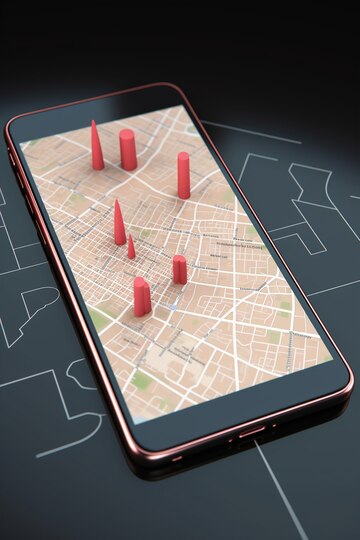Using GPS Trackers to Monitor Your Family's Environmental Footprint




In today’s world, where sustainability and environmental consciousness are becoming increasingly important, many families are looking for ways to reduce their environmental footprint. One innovative approach to this is through the use of GPS trackers. While GPS technology is traditionally associated with navigation and personal safety, it can also play a significant role in helping families monitor and reduce their environmental impact. This article will explore how GPS trackers can be used to track and optimize daily activities, reduce carbon emissions, and promote more sustainable living. We’ll also discuss how you can find your family and friends using GPS technology to foster a more eco-friendly lifestyle.
The Connection Between GPS Technology and Environmental Monitoring
What is GPS Technology?
GPS, or Global Positioning System, is a satellite-based navigation system that allows users to determine their exact location anywhere on Earth. While GPS is widely used for navigation, it also has applications in environmental monitoring. By tracking movements and activities, GPS can provide valuable data that can be analyzed to understand and reduce environmental impacts.
When you download the tracking app that integrates GPS technology with environmental monitoring, you gain the ability to track your family’s activities and understand how your daily choices contribute to your overall environmental footprint. This data can be used to make more informed decisions that lead to a more sustainable lifestyle.
How GPS Trackers Can Monitor Your Family's Environmental Footprint
Tracking Daily Commutes and Transportation
One of the most significant contributors to a family’s environmental footprint is transportation. Whether it’s driving to work, school, or running errands, the choices we make in how we get from place to place have a direct impact on our carbon emissions.
Using a family locator GPS tracker find your daily routes and transportation habits, you can monitor how often you drive, the distances traveled, and the time spent in transit. By analyzing this data, you can identify areas where you can reduce your carbon footprint, such as:
- Carpooling: By sharing rides with other family members or friends, you can reduce the number of vehicles on the road, thereby decreasing your carbon emissions.
- Using Public Transportation: GPS data can help you find the most efficient public transportation routes, encouraging the use of buses, trains, and other forms of mass transit instead of personal vehicles.
- Walking or Biking: For shorter trips, consider walking or biking instead of driving. GPS trackers can help you find the safest and most efficient routes for these eco-friendly modes of transportation.
- Planning Efficient Routes: GPS technology can optimize your driving routes, helping you avoid traffic congestion and unnecessary detours, which can save fuel and reduce emissions.
By making small changes to your transportation habits, you can significantly reduce your family’s environmental impact.
Monitoring Energy Usage at Home
Another major contributor to a family’s environmental footprint is energy consumption at home. While GPS trackers are not directly involved in monitoring energy usage, they can be integrated with smart home systems to provide insights into how energy is being used and where efficiencies can be made.
For example, when you download the tracking app that connects with your smart home devices, you can track when and where lights, appliances, and heating/cooling systems are being used. This data can help you identify patterns and areas for improvement, such as:
- Reducing Standby Power: Many appliances consume energy even when they are turned off. By tracking when devices are left on standby, you can take steps to unplug them when not in use.
- Optimizing Heating and Cooling: Use GPS data to monitor when family members are at home or away, and adjust your heating and cooling systems accordingly. This can help reduce energy consumption and lower your utility bills.
- Automating Lighting: By integrating GPS with smart lighting systems, you can automate lights to turn off when no one is home or when rooms are not in use, reducing unnecessary energy consumption.
These insights can help your family make more informed decisions about energy usage, leading to a smaller environmental footprint.
Tracking Food Consumption and Waste
Food consumption and waste are often overlooked when considering a family’s environmental impact. However, the food we eat, where it comes from, and how much we waste all contribute to our overall footprint. GPS trackers can be used to monitor food-related activities and help families make more sustainable choices.
For example, by using a GPS tracker to monitor trips to the grocery store, you can track how often you shop, the distance traveled, and the types of products purchased. This data can help you identify opportunities to reduce your food-related footprint, such as:
- Buying Local: By tracking the distances traveled to purchase food, you can prioritize buying local and seasonal produce, which reduces the carbon emissions associated with transportation.
- Reducing Food Waste: GPS data can help you monitor how often you throw away food and identify patterns that lead to waste. This can encourage more mindful shopping and meal planning to reduce waste.
- Supporting Sustainable Practices: By tracking your shopping habits, you can make more conscious choices about the products you buy, such as choosing items with minimal packaging or those produced using sustainable practices.
These changes can help your family reduce its environmental impact and promote more sustainable living.
Encouraging Sustainable Outdoor Activities
Outdoor activities, such as hiking, camping, and biking, are great ways for families to connect with nature. However, these activities can also have an environmental impact if not done sustainably. GPS trackers can help families engage in outdoor activities in a more eco-friendly manner.
For example, by using GPS trackers to monitor your outdoor activities, you can:
- Minimize Environmental Impact: Track your routes and avoid sensitive ecosystems or wildlife habitats. GPS data can help you stick to established trails and minimize your impact on the environment.
- Reduce Travel Emissions: Use GPS to find nearby parks, trails, and natural areas, reducing the need for long drives and lowering your carbon emissions.
- Plan Eco-Friendly Activities: Use GPS to explore new locations for outdoor activities that emphasize sustainability, such as parks that prioritize conservation or locations that promote Leave No Trace principles.
By using GPS technology to monitor and plan your outdoor activities, you can enjoy nature while minimizing your environmental footprint.


Case Studies: Families Using GPS Trackers to Reduce Their Environmental Footprint
Case Study 1: The Johnson Family’s Journey to Sustainable Living
The Johnson family, a family of four living in a suburban area, decided to make a conscious effort to reduce their environmental footprint. They began by using a family locator GPS tracker find your daily activities and identify areas where they could make more sustainable choices.
The family used GPS trackers to monitor their daily commutes, track their energy usage at home, and analyze their shopping habits. They discovered that their daily commutes were responsible for a significant portion of their carbon emissions. By using the GPS data to find carpool options and optimize their routes, they were able to reduce their transportation emissions by 25%.
In addition, the Johnsons integrated their GPS tracking app with their smart home system to monitor energy usage. They identified that their heating system was running unnecessarily during the day when no one was home. By adjusting their thermostat settings based on the family’s location data, they reduced their energy consumption by 15%.
Through these efforts, the Johnson family was able to significantly reduce their environmental footprint while also saving money on transportation and energy costs. They continue to use GPS tracking to monitor their progress and make further improvements.
Case Study 2: The Green Family’s Commitment to Sustainable Transportation
The Green family, living in an urban area, was concerned about the impact of their daily commutes on the environment. With two working parents and two school-aged children, the family spent a significant amount of time in their car each day. To address this, they decided to download the tracking app and use GPS technology to monitor and optimize their transportation habits.
By analyzing their GPS data, the Greens realized that many of their trips were short distances that could be easily replaced by walking, biking, or using public transportation. They made a commitment to reduce their car usage by 30% over the next year by incorporating more eco-friendly transportation options.
The family also used GPS data to identify the most efficient routes for their remaining car trips, helping them avoid traffic and reduce fuel consumption. As a result, they were able to cut their carbon emissions by 20% within the first six months.
In addition to their transportation efforts, the Greens used GPS tracking to monitor their grocery shopping habits. They began prioritizing local and seasonal produce, which further reduced their environmental footprint. The family’s commitment to sustainability has become a central part of their lifestyle, and they continue to use GPS technology to track their progress and find new ways to reduce their impact on the environment.
Case Study 3: The Miller Family’s Adventure in Sustainable Living
The Miller family, who love outdoor activities, wanted to ensure that their adventures were not harming the environment. They used GPS trackers to monitor their hiking, camping, and biking trips, with a focus on minimizing their environmental impact.
The Millers used GPS data to track their routes and ensure that they were sticking to established trails and avoiding sensitive ecosystems. They also used the data to find nearby parks and natural areas, reducing the need for long drives and lowering their carbon emissions.
In addition, the family used GPS to plan eco-friendly outdoor activities, such as visiting conservation-focused parks and participating in clean-up events. By tracking their outdoor activities, the Millers were able to enjoy nature while minimizing their environmental footprint.
Through their use of GPS technology, the Miller family has become more conscious of their impact on the environment and has made sustainable living a central part of their outdoor adventures. They continue to use GPS tracking to explore new locations and find ways to reduce their environmental footprint.
The Role of GPS Technology in Promoting Sustainable Living
Encouraging Mindful Consumption
One of the key benefits of using GPS technology to monitor your family’s environmental footprint is that it encourages mindful consumption. By tracking your activities and analyzing the data, you become more aware of how your daily choices impact the environment.
For example, by tracking your transportation habits, you can see how much fuel you consume and how many carbon emissions you produce. This information can motivate you to make more sustainable choices, such as carpooling, using public transportation, or walking instead of driving.
Similarly, by tracking your energy usage at home, you can identify areas where you can reduce consumption and lower your carbon footprint. This might involve turning off lights and appliances when not in use, adjusting your thermostat settings, or investing in energy-efficient appliances.
By making more informed choices, you can reduce your family’s environmental impact and promote a more sustainable lifestyle.
Promoting Environmental Awareness and Education
Another important role of GPS technology in promoting sustainable living is that it raises environmental awareness and provides educational opportunities. By tracking your activities and analyzing the data, you can learn more about how your choices impact the environment and discover new ways to reduce your footprint.
For example, by tracking your food consumption and waste, you can learn about the environmental impact of different foods and make more sustainable choices. This might involve choosing plant-based foods, buying locally-produced items, or reducing food waste by planning meals more effectively.
GPS technology can also be used to teach children about sustainability. By involving them in the tracking process and showing them the data, you can help them understand the importance of making eco-friendly choices and encourage them to adopt sustainable habits from a young age.
Facilitating Community Engagement
GPS technology can also play a role in facilitating community engagement and promoting collective efforts to reduce environmental impact. By sharing your GPS data with others, you can participate in community initiatives and collaborate on sustainability projects.
For example, you might use GPS technology to organize carpooling groups, participate in local clean-up events, or track your progress in reducing your environmental footprint as part of a community challenge. By working together, communities can make a bigger impact and promote a culture of sustainability.
Challenges and Considerations When Using GPS for Environmental Monitoring
Privacy Concerns
One of the challenges of using GPS technology for environmental monitoring is the potential for privacy concerns. Since GPS trackers collect and transmit location data, there is a risk that this information could be accessed or misused by unauthorized parties.
To address these concerns, it’s important to choose GPS trackers and tracking apps that prioritize privacy and offer robust security features. Look for devices and apps that use encryption to protect your data and provide options for controlling who has access to your location information.
It’s also important to be mindful of how you share your GPS data. While sharing data with trusted contacts or participating in community initiatives can be beneficial, it’s important to be aware of the potential risks and take steps to protect your privacy.
Data Accuracy and Reliability
Another consideration when using GPS for environmental monitoring is the accuracy and reliability of the data. While GPS technology is generally accurate, factors such as signal interference, environmental conditions, and device limitations can affect the quality of the data.
To ensure that you are getting accurate and reliable data, it’s important to choose high-quality GPS trackers and use them in appropriate conditions. For example, using a GPS tracker with a clear view of the sky and minimal obstructions can help improve the accuracy of the data.
Balancing Convenience and Sustainability
While GPS technology offers many benefits for monitoring and reducing your environmental footprint, it’s important to strike a balance between convenience and sustainability. For example, using a GPS tracker to find the most efficient driving routes can help reduce fuel consumption, but it’s also important to consider alternatives such as walking, biking, or using public transportation.
Similarly, while tracking your energy usage at home can help identify areas for improvement, it’s also important to consider other factors such as the source of your energy and how you can reduce your overall consumption. By taking a holistic approach to sustainability, you can make more informed choices that align with your values and goals.
The Future of GPS Technology in Environmental Monitoring
Advancements in GPS Technology
As GPS technology continues to evolve, we can expect to see new developments that further enhance its capabilities and applications in environmental monitoring. Some of the key advancements to watch for include:
- Increased Accuracy: Advances in satellite technology and data processing are expected to provide even more precise location tracking, which will improve the accuracy of environmental monitoring efforts.
- Integration with IoT Devices: The integration of GPS with Internet of Things (IoT) devices will enable more comprehensive monitoring of environmental factors, such as air quality, water usage, and energy consumption.
- Enhanced Data Analysis: The use of artificial intelligence (AI) and machine learning algorithms to analyze GPS data will provide deeper insights into environmental impact and help identify more effective strategies for reducing it.
The Growing Role of GPS in Sustainability
As GPS technology becomes more advanced and accessible, its role in promoting sustainability is expected to grow. From helping individuals and families monitor their environmental footprint to supporting community and corporate sustainability initiatives, GPS will continue to play a crucial role in shaping a more sustainable future.
By embracing GPS technology and using it to make more informed choices, families can contribute to global efforts to combat climate change and protect the environment for future generations. Whether it’s through tracking daily activities, optimizing transportation habits, or participating in community initiatives, GPS technology offers powerful tools for promoting sustainability and reducing our collective impact on the planet.
Conclusion: Embracing GPS Technology for a Sustainable Future
In conclusion, GPS technology offers a unique and innovative way for families to monitor their environmental footprint and make more sustainable choices. By using GPS trackers to track daily activities, optimize transportation habits, monitor energy usage, and reduce food waste, families can significantly reduce their impact on the environment and promote a more sustainable lifestyle.
While there are challenges and considerations to keep in mind, such as privacy concerns and data accuracy, the benefits of using GPS technology for environmental monitoring far outweigh the potential drawbacks. By embracing GPS technology and using it to make more informed choices, families can contribute to global efforts to combat climate change and protect the environment for future generations.
As GPS technology continues to evolve, its role in promoting sustainability is expected to grow, offering new and innovative ways to reduce our environmental footprint and create a more sustainable future. By embracing this technology and making sustainability a central part of our daily lives, we can ensure that our families and communities thrive in a healthier, more sustainable world.




Lets try Findee
for Free
Download our latest version and please don’t
forget to rate :)

Subscribe Newsletter
Subscribe to the newsletter to be the first to receive interesting news
Let's try out!
Copyright © All Rights Reserved



